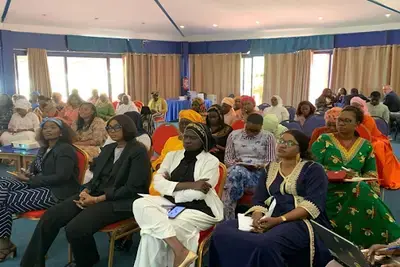
Success Story
Local Mayors Foster Reconciliation in Côte d’Ivoire
Over the last two decades, disputes over land rights, politics and religion have divided ethnic groups in Côte d’Ivoire and culminated in deadly flashpoints, including the 2002 Ivorian civil war and a post-election crisis between 2010 and 2011.
But in November 2013 and February 2014, the Guéré and Yacouba people, two ethnic groups that have historically been rivals, met for a soccer tournament organized by the mayor of Bin-houyé, Jacqueline Gueu, one of Côte d’Ivoire’s few women mayors. Also taking part were players from neighboring Boutouo, Liberia, home to mercenaries who participated in post-election violence that devastated the western part of the country in 2010. During the tournament, the tense relationship between these ethnic groups was replaced with friendly competition.
In the five years since the conflict that followed President Laurent Gbagbo’s refusal to cede power after losing the election in 2010, Ivorians have yet to fully reconcile and old disputes continue to slow progress toward peaceful coexistence. Research suggests that post-conflict reconstruction and governance have better prospects of long-term success when women are involved. Yet, women have historically been excluded from leadership positions in Côte d’Ivoire--only 10 of the country’s 197 mayors are women.
To provide a positive example of women’s leadership capacities and to foster reconciliation in their communities, several women mayors have been working with NDI’s support to organize dialogue sessions and community-building activities at the local level.
The soccer tournament, which included 64 matches between pickup teams from Bin Houyé (a town populated mainly by Yacouba), Toulepleu (a neighboring town populated mainly by Guérés) and Boutouo, was a peace-through-sport initiative led by Mayor Gueu to promote coexistence among these groups. Between 200 and 500 spectators attended each of the matches.
 Two pickup teams participating in the peace-through-sport soccer tournament
Two pickup teams participating in the peace-through-sport soccer tournamentMayor Gueu had previously participated in NDI leadership workshops, funded by a grant from the State Department, to support elected women promoting reconciliation at the local level through measures such as the soccer tournament. The workshops focused on building trust among constituents, tackling gender bias, and setting up communication channels and support networks among women leaders. Participants have used what they learned to strengthen their role in the reconciliation process and identify opportunities to overcome obstacles to women’s political participation.
In a separate training, NDI provided targeted technical assistance to four women mayors from Foumbolo, Sirasso, Bin Houyé and Logoualé to focus on finding solutions to specific challenges. They assessed the attitudes of community members and leaders, and the involvement of women in reconciliation efforts, and they conducted advisory council sessions town hall style to learn the needs of their communities. Based on these conversations they began to draft an action plan to guide women leaders’ reconciliation initiatives.
Last spring, the Institute helped women mayors host dialogues with local residents to address disputes related to reconciliation and/or reconstruction. In each meeting, mayors consulted with traditional, political and religious leaders to decide which sources of tension to address. During dialogues in Foumbolo, Sirasso, Bin Houyé and Logoualé, participants tackled a broad range of topics, including land ownership, political differences and trash disposal. A total of 141 citizens participated.
 Panel discussion on resolving community disputes in Foumbolo, Cote d'Ivoire
Panel discussion on resolving community disputes in Foumbolo, Cote d'Ivoire At the end of the program, seven women mayors, including the four that received targeted technical assistance, came together for an event to share their successes carrying out reconciliation initiatives. Attendees included representatives of civil society, local and national officials, and a representative of the National Commission for Dialogue, Truth and Reconciliation. Later that year, NDI’s Gender, Women and Democracy team collected feedback from women involved in the program, which will be shared with women around the world who hold similar local elected positions. The information also will be compiled into an NDI report on women mayors to be released in March with the support of the Kate Spade & Company Foundation.
In their feedback, the women mayors detailed how media, their families and private lives shaped their political lives, how social and cultural attitudes impacted their ability to govern, and the advantages and disadvantages of being a woman in local office.
Published Feb. 4, 2015



